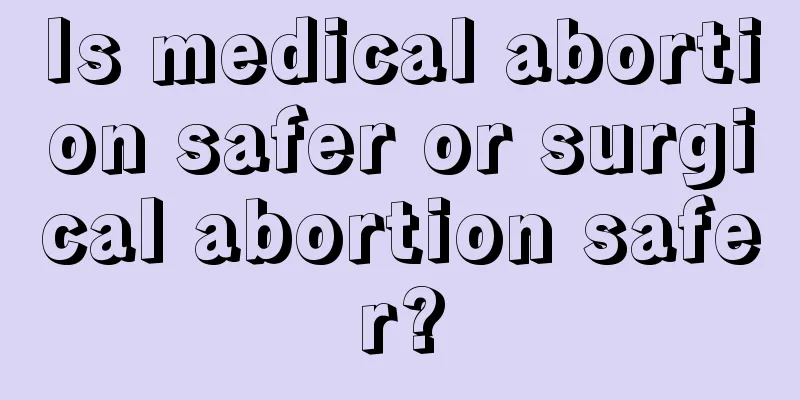What are the symptoms of miscarriage right after pregnancy?

|
Women face many risks during pregnancy, the most feared of which is miscarriage. Once a miscarriage occurs, it means that the body has completely failed, and the miscarriage process will also cause a lot of harm to the body. There are many reasons for miscarriage, including genetic factors, emotional factors, drug factors, etc. So if a miscarriage occurs shortly after pregnancy, what symptoms will generally appear? Symptoms of miscarriage in early pregnancy: For those expectant mothers, being able to give birth to a healthy baby smoothly is undoubtedly a happy thing. But there are still some women who suffer accidental miscarriage during pregnancy, which is definitely not what they want to see. Experts point out that miscarriage in the early stages of pregnancy is a phenomenon that occurs after uterine contraction, placental detachment, and vaginal bleeding. In order to prevent miscarriage in early pregnancy, female friends, especially those of childbearing age, must be aware of the symptoms of miscarriage in early pregnancy so as to facilitate timely detection and active treatment. So, what are the signs of miscarriage in early pregnancy? 1. Vaginal bleeding and increased abdominal pain, be careful of miscarriage It develops from threatened abortion, at which time the amount of vaginal bleeding increases, the paroxysmal lower abdominal pain worsens, or vaginal discharge (rupture of membranes) occurs. Gynecological examination shows that the cervix is dilated, and sometimes embryonic tissue or fetal sac can be seen blocking the cervix. The size of the uterus is consistent with the number of weeks of amenorrhea or slightly smaller. 2. Be careful of incomplete abortion during early pregnancy The products of conception have been partially expelled from the body, but some remain in the uterine cavity, leading to inevitable miscarriage. Because some products of pregnancy remain in the uterine cavity, uterine contraction is affected, resulting in continuous uterine bleeding and even hemorrhagic shock due to excessive bleeding. 3. Threatened abortion A small amount of vaginal bleeding occurs first, often followed by paroxysmal lower abdominal pain or back pain. Gynecological examination shows that the cervix is not dilated, the fetal membranes are not ruptured, the products of conception have not been expelled, the size of the uterus is consistent with the number of weeks of amenorrhea, and there is hope of continuing the pregnancy. After rest and treatment, if the bleeding stops and the lower abdominal pain disappears, the pregnancy can continue; if the vaginal bleeding increases or the lower abdominal pain worsens, miscarriage may become inevitable. What are the symptoms of early pregnancy? Experts say the most obvious symptom of early pregnancy is the cessation of menstruation. In addition, pregnant women may also experience symptoms such as breast swelling, frequent urination, and mild vaginal bleeding. Some pregnant women may also experience nausea, headache, dizziness, and emotional instability. If you find the above symptoms, you should take an early pregnancy test in time because you may be pregnant. 1. Stopping of menstruation If a couple has sexual intercourse around the ovulation period without taking any contraceptive measures, and their menstrual cycles are normal, but they suddenly experience amenorrhea symptoms for more than 5 days, they may be pregnant. 2. Nausea and vomiting Many pregnant women will experience morning sickness starting around the 5th week of pregnancy. Nausea may occur especially in the morning and evening, and vomiting may occur without any reason. The cause of morning sickness is currently unknown, but data suggest that it may be related to human chorionic gonadotropin (HCG) in the human body. When you first become pregnant, the level of human chorionic gonadotropin (HCG) in your body begins to increase. The higher the level of this hormone, the more likely you are to feel nauseous. 3. Breast enlargement and tenderness In the first week or two after conception, your breasts will become larger and softer. Due to the stimulation of pregnancy, the pregnant woman's body will produce a lot of estrogen and progesterone, causing the glands in the breasts to begin to grow, so the breasts will become larger. These hormones also cause the breasts to retain more fluid, so they may become sore and tender. |
<<: What are the symptoms of 1 week pregnancy?
>>: Does thick leucorrhea mean I’m pregnant?
Recommend
What is the cause of occult blood in women's urine?
Many female friends will find that the results of...
Treatment methods for breast hyperplasia, Chinese medicine prescriptions are effective
Breast hyperplasia is a common breast disease in ...
What diseases can cause insufficient blood supply to the brain? How to prevent insufficient blood supply to the brain?
The standard for measuring the blood supply to th...
White spots on nails are not caused by calcium deficiency! The nails that really need to be worried are like this...
We give so much meaning to our nails! "My na...
Why do women always feel tired during this sensitive period?
Symptoms of fatigue will appear in the early stag...
When puberty meets gingivitis
Adolescence is the most important period in a tee...
What should I do if a pregnant woman has a stye in her eye?
Women will be emotionally unstable during pregnan...
What is the cause of kidney deficiency and cold uterus in women?
Friends who like Korean dramas should have seen s...
Symptoms of cervical polyps during pregnancy
When pregnant women find that they have cervical ...
In what environment does longan grow? What are the benefits of eating longan?
From the perspective of traditional Chinese medic...
Dreams may reflect the health of internal organs? It turns out that the Yellow Emperor's Classic of Internal Medicine has already given the answer!
I always dream about things that have nothing to ...
These 4 bad eating habits will make your blood sugar soar. The sooner you correct them, the better.
The "five horses" of diabetes treatment...
Can saline be used to wash the vulva?
Many women who have gynecological problems will a...
You can’t have sex for 20 days after an abortion
Now with the opening of Internet communication te...
How long will it take for labor to occur after contractions begin?
Many people know that when the uterus begins to c...









